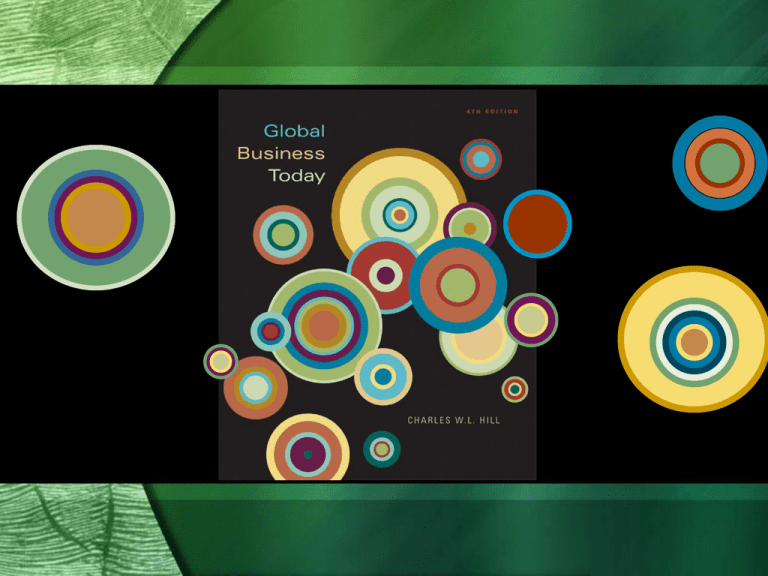
Chapter 4
Ethics in International
Business
4-3
OPENING CASE: Nike
• Nike designs and markets its products itself, but
contracts with various factories for their production.
For more than a decade, rumors and allegations have
abounded that Nike’s products are made in sweatshops
where child laborers earn wages below subsistence level.
• After several negative reports and exposes the company
was forced to reexamine its policies. Nike established a
code of conduct for its sub contractors, and set up a
monitoring system.
McGraw-Hill/Irwin
Global Business Today, 4/e
© 2006 The McGraw-Hill Companies, Inc., All Rights Reserved.
4-4
Ethics in International Business
• Objectives
-
Source of ethical challenges in IB
Effect of ethical challenges on decisions in IB
Causes of poor ethical decisions in IB
Different conceptual underpinnings for ethical
decisions in IB
- What managers can do to
• Promote an awareness of ethical issues
throughout the organization
• Ensure that ethical considerations enter into
decision making
McGraw-Hill/Irwin
Global Business Today, 4/e
© 2006 The McGraw-Hill Companies, Inc., All Rights Reserved.
4-5
Ethical Issues in International
Business
• Arise when a manager makes decisions
consistent with differing national environments
-
Political systems
Legal systems
Economic development levels
Culture
• What is ethical and “normal” in one
environment may not be so in another
McGraw-Hill/Irwin
Global Business Today, 4/e
© 2006 The McGraw-Hill Companies, Inc., All Rights Reserved.
4-6
Ethical Issues in International
Business
• Arise most often in the context of:
-
Employment practices
Human rights
Environmental policy
Corruption
An MNC’s perceived moral obligations to
society
McGraw-Hill/Irwin
Global Business Today, 4/e
© 2006 The McGraw-Hill Companies, Inc., All Rights Reserved.
4-7
Employment Practices
• What standards should be applied?
- Home nation’s
- Host nation’s
- Other/ Best practices?
Hiring practices, labor relations, diversity issues,
employment conditions are some specific issues
that require careful thought
McGraw-Hill/Irwin
Global Business Today, 4/e
© 2006 The McGraw-Hill Companies, Inc., All Rights Reserved.
4-8
Human Rights
• A manager can assume as universal her/his views
on freedom of:
- Association
- Speech
- Assembly
- Movement
- Political repression
• What is the responsibility of an MNC to uphold
different standards of human rights?
McGraw-Hill/Irwin
Global Business Today, 4/e
© 2006 The McGraw-Hill Companies, Inc., All Rights Reserved.
4-9
Repressive Regimes
• Is it ethical for MNCs to operate in countries with
repressive regimes?
- Is inward investment an agent for change?
- What is the limit beyond which inward investment
would not be justified under all circumstances?
- What if competitors from other nations invest and
you don’t?
- Yahoo, Microsoft, Google..policing net activities in
China
McGraw-Hill/Irwin
Global Business Today, 4/e
© 2006 The McGraw-Hill Companies, Inc., All Rights Reserved.
4 - 10
Environmental Policies
• Locally mandated environmental standards may
be inferior to those an MNC knows it can achieve
• Tragedy of the commons: a resource held in
common by all, but owned by no one, is overused
by some, resulting in degradation.
• If a decision is legal but unethical, should it be
taken?
McGraw-Hill/Irwin
Global Business Today, 4/e
© 2006 The McGraw-Hill Companies, Inc., All Rights Reserved.
4 - 11
Corruption
• Government officials may ask for bribes for an MNC to “get
things done”
- Is an MNC’s manager who agrees a corrupt manager?
- Should an MNC ever accede to bribery demands?
• Foreign corrupt practices act (USA)
• Convention on Combating Bribery of Foreign Officials in
International Business Transactions (OECD)
McGraw-Hill/Irwin
Global Business Today, 4/e
© 2006 The McGraw-Hill Companies, Inc., All Rights Reserved.
4 - 12
MNC Power and
Moral Decisions
• MNCs have power over a host country
- They can move production away
- Along with power arise obligations (?)
• Power is morally neutral
- How it is used is what matters
- Perceptions of how it should be used and of its impact
vary
• Company view
• Host country view
McGraw-Hill/Irwin
Global Business Today, 4/e
© 2006 The McGraw-Hill Companies, Inc., All Rights Reserved.
4 - 13
MNC and Social
Responsibility
• Social responsibility: business decisions
should be made after consideration of
social consequences of economic actions
- Noblesse oblige: honorable and
benevolent behavior is the responsibility
of those in power
- Benevolent behavior responsibility of
only successful business?
McGraw-Hill/Irwin
Global Business Today, 4/e
© 2006 The McGraw-Hill Companies, Inc., All Rights Reserved.
4 - 14
Determinants of Ethical Behavior
• Organization culture
• Personal ethics
• Decision making processes
• Leadership
• Unrealistic / realistic performance goals
McGraw-Hill/Irwin
Global Business Today, 4/e
© 2006 The McGraw-Hill Companies, Inc., All Rights Reserved.
4 - 15
Philosophical Approaches to Ethics
• Straw men: often adopted, offer
inappropriate guidelines for MNC
behavior
- Friedman doctrine
- Righteous moralist
- Naïve immoralist
• Utilitarian and Kantian Ethics
• Rights theories
• Justice theories
McGraw-Hill/Irwin
Global Business Today, 4/e
© 2006 The McGraw-Hill Companies, Inc., All Rights Reserved.
4 - 16
Ethical Decision Making
• Hiring and promotion
• Organization culture and leadership
• Decision-making processes
- Stakeholder perspectives
• Ethics officers
- Codes of ethics
• Moral courage:
walk away from profitable and unethical decision
McGraw-Hill/Irwin
Global Business Today, 4/e
© 2006 The McGraw-Hill Companies, Inc., All Rights Reserved.





